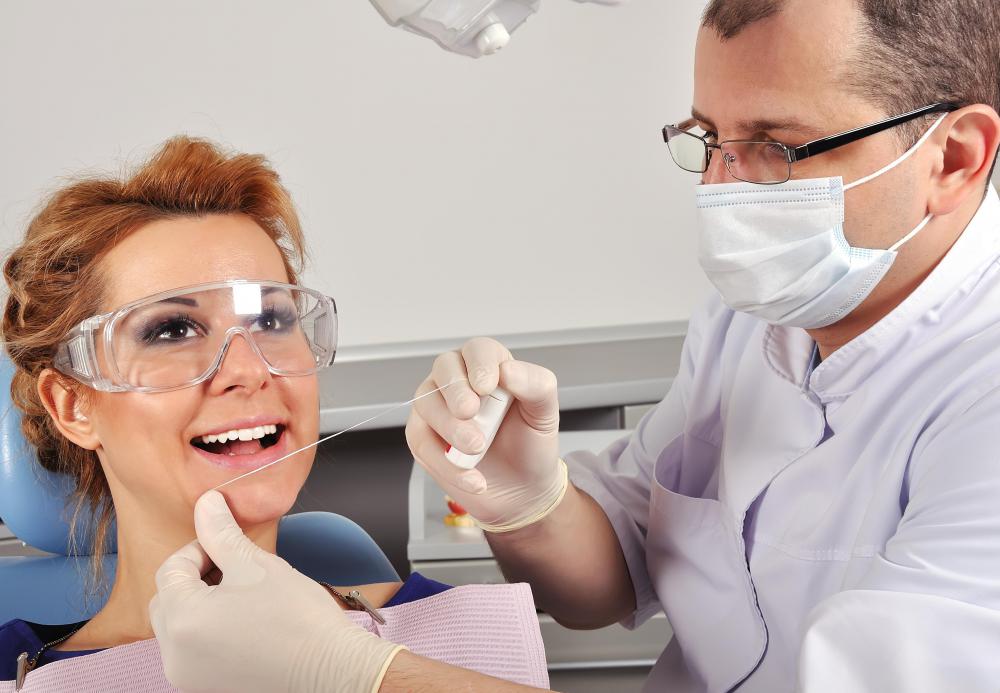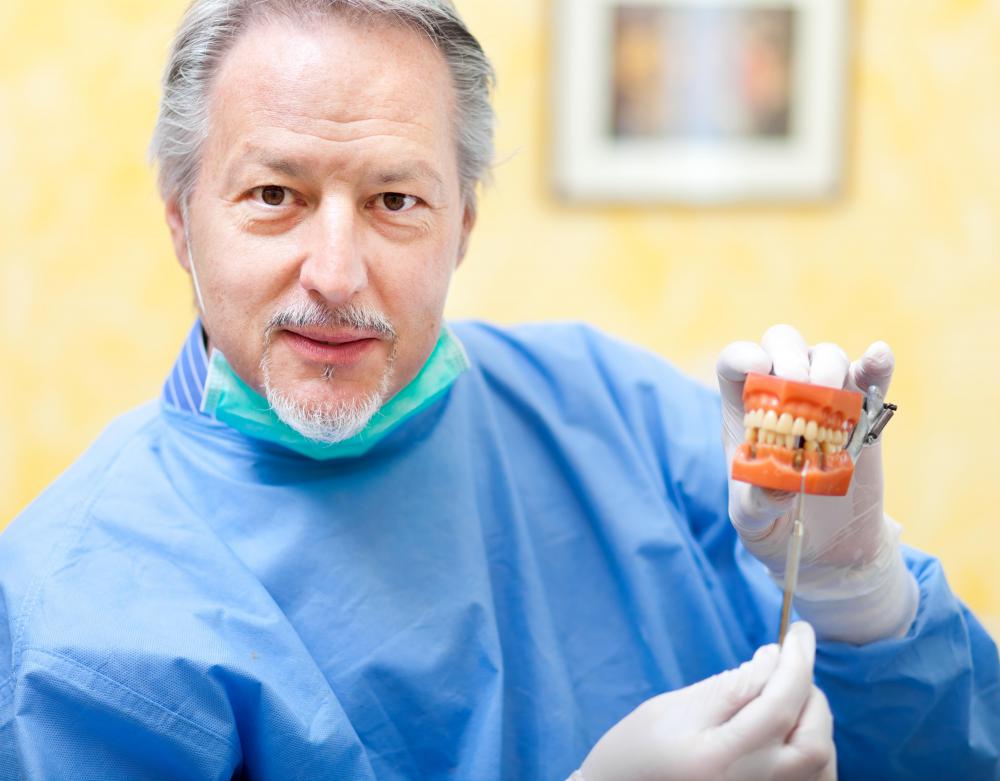At WiseGEEK, we're committed to delivering accurate, trustworthy information. Our expert-authored content is rigorously fact-checked and sourced from credible authorities. Discover how we uphold the highest standards in providing you with reliable knowledge.
What does a Forensic Odontologist do?
A forensic odontologist is a fully licensed dentist who is responsible for examining the teeth of corpses and bite marks on bodies. There are four primary roles for a forensic odontologist: consulting services, expert opinions, teaching, and research. There are very few forensic odontologists, as this is a very specialized skill.
When a human body is discovered and there is no obvious way to identify the person, a forensic odontologist is called. She is responsible for taking a cast or mold of the teeth and jaw from the remains and using this to accurately identify the person according to dental records. The dental records used can vary widely from x-rays taken within the last ten years to fillings or other work that has an identifying mark.

This identification is used to determine the next of kin and start the investigation into the cause of death. Mistakes or carelessness have a huge impact on the surviving family members, police investigation, and theory surrounding the cause of death. Most professional forensic odontologists are consummate professionals who take great care with their work, as they are well aware of the impact of any error.

As a consultant, the forensic dentist can work for several law enforcement agencies providing identification and research services as needed. Upon acceptance of a request, the forensic odontologist is responsible for the entire process, including providing expert witness testimony at any legal proceedings, if necessary. Due to their expertise in teeth, forensic dentists may also be called in to work on human bite marks and determine whom they belong to.

A forensic dentist can provide expert testimony services, as long as he has investigated the teeth mold and can provide definitive answers to questions raised in court. Expert witness testimony is also used to describe how someone is innocent of the charges, due to specific features of the person's bite that eliminates him. Preparation for providing expert testimony includes studying the case file, testifying in court, and being available to answer any follow-up questions, as needed.

Teaching specialized courses at the university level is a common practice for forensic dentists. They may also offer seminars or write books on their area of expertise within this field. Speaking tours of specialized law enforcement or forensic science conferences or meetings is not uncommon. The vast majority of forensic odontologist professionals are actively engaged in research. They may receive funding from technology companies, professional services firms, or dental organizations. There is a wide range of research topics available to a specialist in this field.
AS FEATURED ON:
AS FEATURED ON:
















Discussion Comments
I had no idea such a job existed! I watch those crime procedural shows sometimes, and they often talk about the victim's dental records. However, it seems like in the show, usually the medical examiner or forensic pathologist deals with the teeth and dental records. I bet in real life, a forensic odontologist would actually be the one doing that!
However, I'm not surprised that television shows don't always get the crime solving process completely right!
@KaBoom - It definitely would be cool to be part of an in-demand field. But I imagine that not everyone who goes to dental school is interested in forensic careers! I bet a lot of them want to work on actual patients.
A lot of people are freaked out by the idea of dealing with dead bodies (myself included) and dealing with crime all the time might be too much for some people. So I'm really not surprised there aren't that many people who want to be forensic odontologists.
@Mor - You are right! I once saw an exhibit at a local museum where they had used medical imaging to find out how the mummy they had on display died! They found that the woman had died in her 60's of dental abscesses. I'm assuming someone that had forensic odontologist education probably made that conclusion.
Anyway, I think it must be cool to work in such a specialized field. After all, since there aren't that many forensic odontologists, it's probably not that hard to find a job if you happen to be one!
@Mor - I think one of the most famous examples of that is with King Tut. There's a lot of debate over what killed him, but one of the front runners is a tooth abscess. They only found it recently with new x-rays that revealed it.
I think that would be very interesting and exciting, but personally I'd rather be doing forensic biology rather than forensic paleontology. It must feel really good to contribute to a police investigation and I think if you're a meticulous person who appreciates detailed work, you'd really enjoy a career in that field.
@browncoat - I've heard that forensic technicians are often called upon to help out with paleontology finds as well. I imagine odontologists would be quite a bit in demand for that sort of thing.
I mean, one of the only things I know about teeth is that the reason we have wisdom teeth. Once people used to wear their teeth down over the course of their life and would need the wisdom teeth to come in later on so that they could act like a spare.
People would put a lot of wear and tear on their teeth by eating much more plant life and even doing things like chewing animal skins to make them into a soft leather.
Without extra teeth coming in people would have been unable to chew by the time they were in their late 20s.
So, by looking at the state of their teeth, an experienced odontologist would be able to tell a lot about ancient people by their teeth.
You can actually tell a great deal about a person by his or her teeth. For starters, you can roughly tell what kind of diet the person has. Even if you brush your teeth regularly, if you have juices and sodas all the time they leave their marks. If you're primarily a vegetarian, that can leave traces as well, as can excessive coffee or tea or wine.
And then there's other things that can show up that you might not expect. I read a book once where a character managed to identify that a murdered victim with forensic odontology. It turned out that she was a seamstress who always bit the threat at the same point and managed to wear a groove in her teeth.
It sounds fascinating when you put it like this, but I imagine it takes a lot of very detailed work that most people would find quite boring.
Post your comments